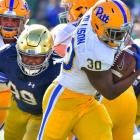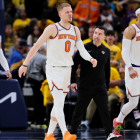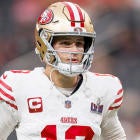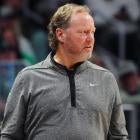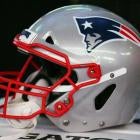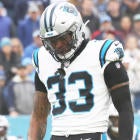University of Pittsburgh running back Qadree Ollison was a redshirt freshman in 2014 when James Conner rushed for 1,765 yards and scored 26 touchdowns. A season later, Ollison rushed for 1,121 yards and 11 touchdowns in place of Conner, who was diagnosed with cancer while recovering from a knee injury.
More than three years later, Ollison, who is fresh off a 1,213-yard, 11-touchdown senior campaign, is looking to prove to NFL teams that not only is his running style similar to Conner's -- they're both 6-foot-2, around 230 pounds -- but that he's a complete football player that embraces every aspect of the game, from knowing the playbook inside and out to blocking to special teams.
We recently spoke to Ollison about his his college career at Pitt and what he hopes to accomplish at the NFL combine next week in Indianapolis. We spoke separately to Andre Powell, Ollison's running backs and special teams coach at Pitt, and we've included his comments below.
Q: You and James Conner are listed at similar heights and weights. How do your styles of play compare?
Ollison: Yeah, we're like the exact same size. I think we have similar running styles. I watched a lot of his tape and I took a couple of things from his game and try to apply them to mine. I just think we have very similar styles and maybe that comes from having the same coaches in college, really. We both have the same running backs coach every year so maybe that's just how it turns out. But I think we're similar in structure, similar in size. He's great at all phases of the game and I try to be the same.
Coach Powell: They're both big guys, they both can run, they both have good ball skills. And I think they're real similar. I think James may be a tad twitchier but the one thing that helps make Ollison the running back he is is that his football IQ is off the charts. And I think that's what's going to separate him from a lot of guys that may have a little bit more talent than he does. And he knows -- you can't trick him -- he knows everything about the offense, the passing game, the running game, line calls, the defense.
Q: We just watched you against Syracuse and Clemson. You had 192 yards against Syracuse, and while you weren't as successful against Clemson, you still broke off a few big runs. We were surprised at your ability to turn the corner.
Watching Pitt’s Qadree Ollison against Clemson and I was impressed with his speed for a big guy. Have more coming on him later today. pic.twitter.com/UEwHad88cz
— ryan wilson (@ryanwilsonCBS) February 20, 2019
Ollison: I think [my speed] surprises a lot of people. They seem that I'm 230 pounds and they don't think I'm that fast. But I've shown on film that I can hit the home run and can turn the corner. That's not something that's surprising to me or to anybody on our team -- it's just something that I've done over the years is to become faster, break those long touchdown runs and not get caught. You have to be able to have that which makes you multidimensional and that makes you more than just a bruiser. You also have the ability to hit the home run, and that makes you really valuable, in that sense.
Q: You caught 11 passes your senior season, and sometimes that's a function of the offense you play in. But if NFL teams ask you if you can be a consistent threat in the passing game, what are you telling them?
Ollison: I'll just go out and show them in the drills. And I also put it on film, as well. The times I was targeted I caught the ball. We didn't run a lot of screen passes [at Pitt] or designed passes to the running back, but [the times I was thrown to] I have all that on tape -- I've shown it, making tough catches. And obviously, I need to go out and show [NFL teams] in the drills that I can catch.
It's only ever a question when it's a bigger running back. When there's a guy, 225-230 pounds, they label him as a big back -- we don't know if he can catch -- like you said, they compared me to James (Conner) and they had the same questions about him when he came out of college. He clearly can catch fine. And I always knew that. People at Pitt knew that before anyone else knew and it's like a big surprise to them. But I know I can catch, I have really good hands, I'm confident in that.
Coach Powell: He's got really good hands, he can run disciplined routes. Our backs were not involved in the passing game as much this year as when James was here. But [Ollison's] very capable. He's got good ball skills, he can pluck the ball, he can use his hands, he knows when to use his body, he knows how to set up defenders. Take another guy with similar skills that not as smart, they couldn't do the things he does.
Q: You had 56 yards on 13 carries against Clemson. Was that the best defense you faced all year?
Ollison: One-hundred percent. One-hundred percent that was the best defense we played all year. It was even tougher because the conditions weren't great, the passing game was struggling, it wasn't helping that it was raining, we had a young quarterback -- it was definitely tough sledding against three potential first-round picks [on Clemson's defensive line].
Q: We noticed in that Clemson game that while the running lanes weren't there, you were blocking your butt off, particularly when facing off against linebacker Kendall Joseph.
Ollison: I think blocking is one of my strongest suits. I think I'm the best pass protector out there, out of any of the running backs. I take price in protecting the quarterback. I take pride in recognizes defenses and knowing blitzes, having that IQ and being able to understand where the blitz is coming from. And if you want to get to the next level you've got to be able to do that and my college coach stressed that and he made me a really, really good pass protector -- not just being big and having a big frame but also having the fundamentals and technique, as well. I block every single game and there's not a time this year where I turned down a pass protection or didn't recognize it, or miss someone. It's something I take pride in and consider one of my strengths.
Coach Powell: He's really good [as a blocker] because ... we ask a lot out of our backs and we probably ask more out of Ollison and this crew of backs that we had than we may ask of our guys this year. Not in terms of trying to keep them out of harms way in terms of who they may have to block, but all the different scans we gave them to keep those hits off our quarterback. And he knows. He knows what kind of rush style you're going to give him. He's going to know if you're a bull rusher, if you're a guy that likes to use your hands, he's going to know if you like to go inside or outside. He's going to know when it's coming, and most of the time before the ball is snapped. I mean, he's really good. He's a really good player.
Q. One of the best ways to make an NFL roster is through special teams. Do you feel that's a strength?
Ollison: I was the personal protector on punts, I've played on kickoff return, I've played on punt return. I've played on all special teams. Once again, my coach (RBs/ST) made sure we were on special teams and that we got to like it. A lot of people don't like it at first but once you get older and realize that this is a way to earn a job you really start to love it. I love special teams -- I just want to play football. At the end of the day, that's really my dream: I want to play football in the National Football League. And whatever I have to do to do that, I'm going to do it.
Coach Powell: Some guys embrace it. Some guys tolerate it. [Ollison] embraced it. He played on every special teams; he was on the field goal team this year, he was on the punt team -- as a starter. There were times where he started on kickoff return. He's been on punt return. And the interesting thing about kickoff return, he was never a return man. But [in 2017] he was our best guy. Every week we would pit him against the best coverage guy on the other team. So he never played the same position.
We would always track and say, 'OK, this guy makes most of the tackles, Ollison, you got him this week.' And he was really good. Being a special teams coach and being around a long time and seeing a lot of guys go to the next level, understand that unless you're a first-round draft pick you better be a good special teams player. The more things you can do the more valuable you are.
Q: What would you say the one thing you need to work on as you prepare for the next level?
Ollison: To be honest, I don't think I have a ton of weaknesses. But I guess it would be -- I don't think it's something I need to get better on -- just getting shiftier. But at the same time, you've got to know your strengths and weaknesses. That would probably be one thing but I've shown that I can make people miss -- but sometimes you've got to make not just the first guy miss but the second guy and the third guy. So I guess that would be something that I need to work on.
Coach Powell: We asked a lot of [Ollison] and he really, really did a good job in every phase: School, he did a good job with his degree. He did a good job socially, never getting in trouble. He did a good job as a leader, as a face of the program. You can't ask any more of a guy.
We'll be in Indianapolis for the NFL combine and you can follow all our coverage on CBSSports.com and CBS Sports HQ.












